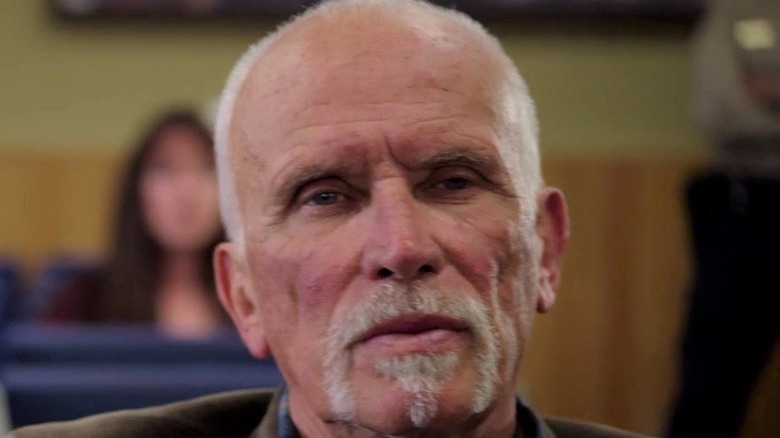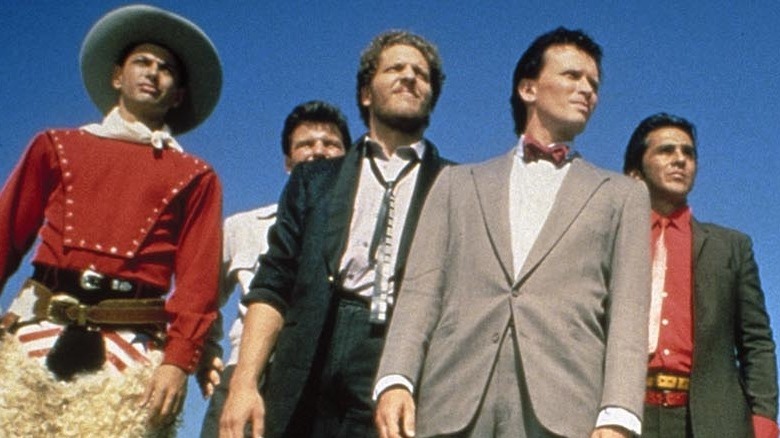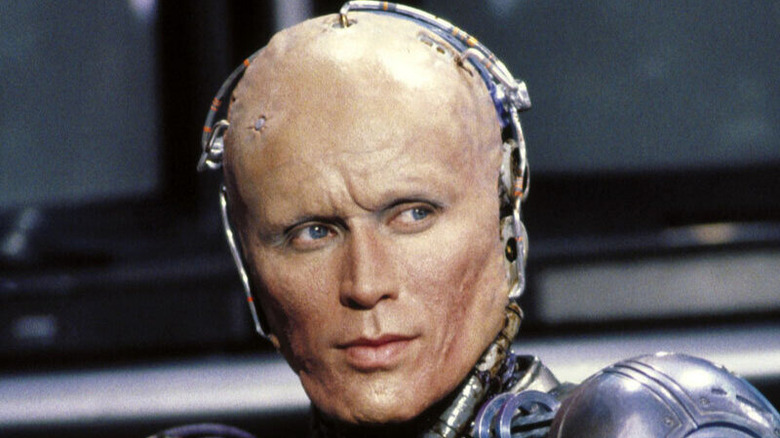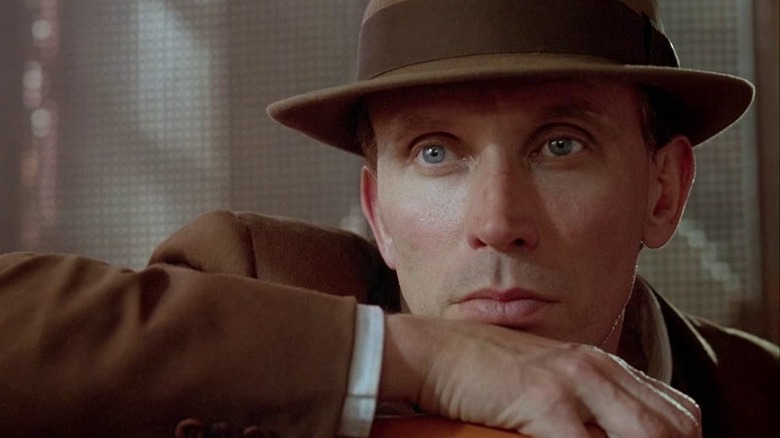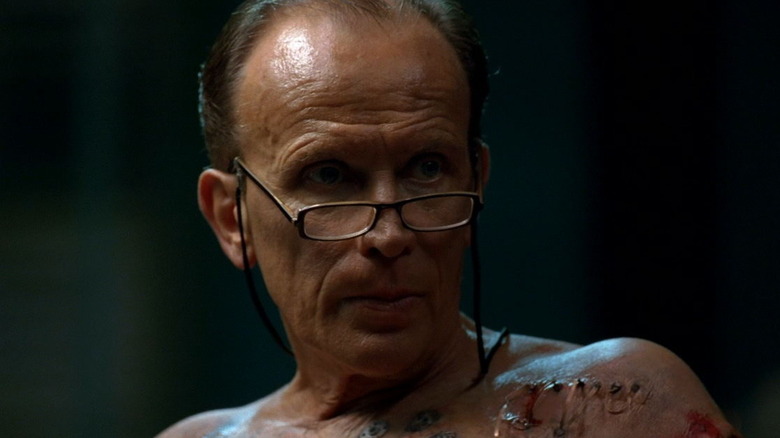Why Lucian From Longmire Looks So Familiar
The title character of crime drama "Longmire" is an old-fashioned cowboy in a 21st century world, but that suits him just fine. Played by Robert Taylor, Longmire is the long-time sheriff of Absaroka County, where his laconic demeanor and introspection help him solve the various cases that come to the sheriff's office.
The show reveals early on how Longmire was hired and trained by his predecessor, former Sheriff Lucian Connally. Lucian is also something of a cowboy, now retired but he sometimes emerges to help Longmire with cases. The character was never a regular but his depth and rugged demeanor made him a fan favorite, leading to calls for a Lucian spinoff in at least one corner of the Internet.
Prior to "Longmire" however, the man behind Lucian has worked s an actor and director for decades, becoming known for his cold baritone and striking features. The latter meant that he's been employed by genre TV and film for many years, making appearances in some stone cold classics.
Here's where you may have seen him before.
Peter Weller's first lead role was in a sci-fi comedy
By the '80s, Peter Weller had found success in stage, TV and on film, including acclaimed roles in "Shoot The Moon" and "Of Unknown Origin", but playing the title role of "Buckaroo Banzai" was his real breakthrough.
1984's "The Adventures of Buckaroo Banzai Across The 8th Dimension" stuffed interdimensional aliens, Jeff Goldblum in a cowboy costume, and full band performances into an already absurd sci-fi comedy immediately destined for cult status. Even without Weller, the movie would have never been forgotten, yet it's his central performance that keeps the insanity of the premise grounded. He's the epitome of "cool" as Buckaroo Banzai, deeply zen in his approach to the world ("Wherever you go, there you are"), while still committing to the role of a passionate, successful scientist-cum-rock musician. Like several other films in Weller's filmography, the whole thing would fall apart if the actor winked at the camera even for a second, and he never does.
"Buckaroo Banzai" opened against several bigger movies of the same year, including "Ghostbusters" and "Temple of Doom," ultimately flopping in theaters (per Box Office Mojo). The film was a success on home video, however, and soon accrued a loyal following that endures to this day. Weller moved ahead with a career increasingly rooted in genre, including this next masterpiece.
The actor became an icon when he played RoboCop
"Dead or alive, you're coming with me." When the actor played "RoboCop" in the exploitative, brilliant action film of the same name, Weller cemented himself for good as an icon of stoic yet smoldering performances in genre movies and television.
Weller plays Murphy, a police officer in a dystopian future Detroit where corporations have bought out the department and city council members take hostages. When Murphy is violently gunned down by a gang he's pursuing, his body is revived by conglomerate Omni Consumer Products, transforming him into a new kind of cyborg: RoboCop.
"RoboCop" has rightly been acclaimed for the subversive screenplay and director Paul Verhoeven's purposeful — and often hilarious — ultraviolence. But it's Weller's striking, opaque eyes and body language that find humanity in the machine, his performance internalizing so much resigned pain and heartbreak once Murphy finds out the truth about his past. The ending wouldn't work nearly as well either if it didn't have Weller's truly serene delivery of the film's last line ("What's your name, son?" "Murphy...").
The success of the film resulted in a 1990 sequel, "Robocop 2," where Weller reprised his role, but it didn't come near the first in quality or box office.
He teamed with David Cronenberg for "Naked Lunch"
Weller found arguably his greatest screen performance after Murphy when he joined the bizarre, deeply meta 1991 David Cronenberg adaptation of William Burroughs' cult novel, "Naked Lunch." The film starred the actor as Bill Lee, an exterminator plunged into a grotesque and possibly insectoid conspiracy after he accidentally kills his wife in a William Tell game (much like the real William Burroughs).
Cronenberg famously decided to not make a straightforward "Naked Lunch" adaptation and combined the facts of Burroughs' life with the hideous addictions and conspiracies embedded in his books. It's less a movie about the characters of "Naked Lunch" and more focused on what would make a person write the novel in the first place. The result is surreal, funny, and sometimes deeply moving, as Lee discovers that the price he pays for his art will always be the woman he loves. Never again was Weller's deadpan expression used to such hilarious and devastating effect, especially the ending.
Weller's best TV role was on a classic Fringe episode
Wweler did appear in "Star Trek Into Darkness" but he has slowed down his film work as he's gotten older, maybe because he's been pursuing degrees in art history. Nevertheless, the millennium has seen the actor not only acting in small screen roles frequently, but directing as well. He's helmed episodes of "Hawaii Five-0", "The Strain", and "Mayans MC" and guest starred on several other series.
His best on-screen television role is likely when he appeared on the second season of cult sci-fi drama "Fringe," appearing in what many fans argue is one of the best episodes of the series, if not one of the great TV episodes: "White Tulip".
The episode featured Weller as Dr. Alistair Peck, an astrophysics professor who has effectively mutilated his body into a time machine. Using massive amounts of energy, Peck provides the playful narrative thrust of the episode by "rewinding" his movements over and over, effectively erasing the first 15 minutes of the plot at one point.
The Fringe Team soon discovers the heartbreaking motivations behind his transformation, leading to a brilliant, wrenching climax – and for one lead character, a moment of sheer grace. Like "Robocop" and "Naked Lunch" before it, the episode's absurd sci-fi conceit wouldn't work nearly as well without Weller's detached yet intense presence. One scene where Walter Bishop (John Noble) and Alistair discuss forgiveness, God, and the consequences of science has some of the best acting of the whole series, and much of that — and the quality of the episode — is thanks to the continued nuance and skill of Peter Weller.
